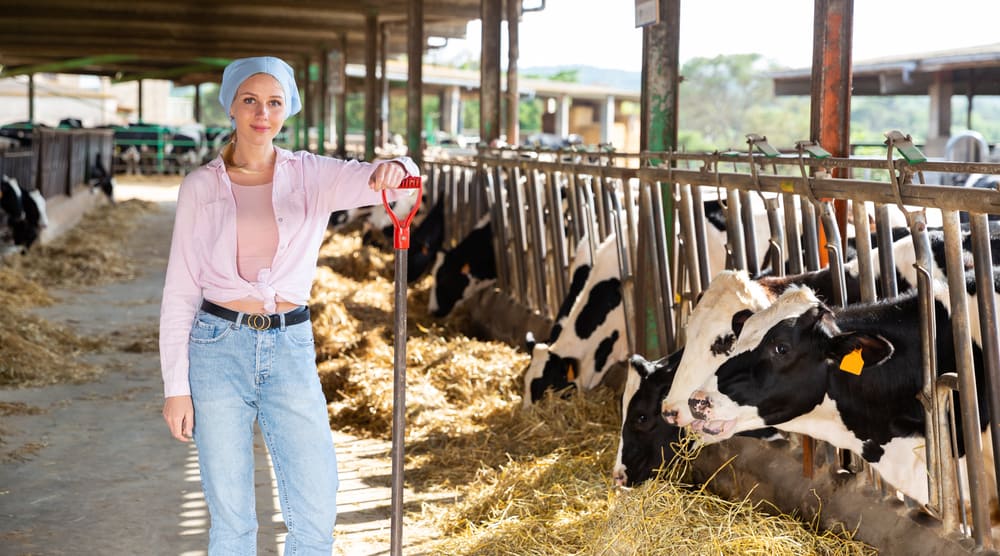Cow farming, particularly in the dairy and beef industries, plays a significant role in Australia’s agricultural sector. Jobs in this field can be diverse, ranging from hands-on farm work to management roles. Here’s an overview of the types of jobs available, their requirements, benefits, and challenges.
Types of Cow Farming Jobs
- Dairy Farm Worker
- Responsibilities: Milking cows, feeding, cleaning barns, maintaining equipment, and monitoring cow health.
- Requirements: Physical fitness, ability to work early hours, and some knowledge of animal husbandry.
- Beef Cattle Farmer
- Responsibilities: Raising cattle for beef production, managing pasture, breeding programs, and marketing livestock.
- Requirements: Knowledge of cattle breeding and nutrition, as well as experience with machinery.
- Farm Manager
- Responsibilities: Overseeing daily operations, managing staff, budgeting, and ensuring compliance with regulations.
- Requirements: Strong leadership skills, experience in farming, and often a degree in agriculture or related fields.
- Veterinary Technician
- Responsibilities: Assisting veterinarians in the health care of cows, administering treatments, and conducting health checks.
- Requirements: Veterinary technician qualification and experience in large animal care.
- Livestock Nutritionist
- Responsibilities: Developing feeding programs and nutritional plans for optimal cattle health and production.
- Requirements: Degree in animal science or nutrition, with knowledge of cattle diets.
- Agricultural Consultant
- Responsibilities: Providing advice on farm management, crop and pasture production, and livestock health.
- Requirements: Experience in agriculture and often a relevant degree.
Benefits of Working in Cow Farming
- Job Stability: The demand for dairy and beef products provides a stable job market.
- Rural Lifestyle: Many jobs are located in rural areas, offering a quieter lifestyle and connection to nature.
- Career Progression: Opportunities for advancement into management or specialized roles.
- Hands-On Work: For those who enjoy working with animals and the outdoors, cow farming can be highly rewarding.
- Community: Many farming communities offer a strong sense of belonging and support.
Challenges of Cow Farming Jobs
- Physical Demands: Jobs can be physically demanding, requiring long hours and manual labor.
- Weather Dependency: Farming can be heavily impacted by weather conditions, affecting job security and productivity.
- Regulatory Compliance: Adhering to health and safety regulations can be complex and time-consuming.
- Market Fluctuations: Prices for dairy and beef can vary, impacting income stability.
- Work-Life Balance: The demanding nature of farming can make it challenging to maintain a work-life balance.
Salary Overview for Cow Farming Jobs in Australia
The salaries for cow farming jobs in Australia can vary widely based on the specific role, location, level of experience, and the size of the farm. Here’s a breakdown of typical salaries for various positions within the cow farming industry:
1. Dairy Farm Worker
- Average Salary: AUD 50,000 to AUD 65,000 per year.
- Hourly Wage: Approximately AUD 20 to AUD 30.
2. Beef Cattle Farmer
- Average Salary: AUD 55,000 to AUD 80,000 per year, depending on herd size and operational scale.
- Hourly Wage: Typically AUD 25 to AUD 35.
3. Farm Manager
- Average Salary: AUD 70,000 to AUD 100,000 per year.
- Hourly Wage: About AUD 30 to AUD 50, depending on experience and responsibilities.
4. Veterinary Technician
- Average Salary: AUD 55,000 to AUD 75,000 per year.
- Hourly Wage: Around AUD 25 to AUD 35.
5. Livestock Nutritionist
- Average Salary: AUD 70,000 to AUD 90,000 per year.
- Hourly Wage: Approximately AUD 35 to AUD 45.
6. Agricultural Consultant
- Average Salary: AUD 75,000 to AUD 110,000 per year, depending on experience and specialization.
- Hourly Wage: Typically AUD 40 to AUD 60.
Factors Influencing Salaries
- Experience: More experienced workers generally earn higher wages.
- Location: Salaries can vary significantly between urban and rural areas, as well as across different states.
- Farm Size: Larger operations may offer higher salaries due to increased responsibilities and revenue.
- Specialization: Positions requiring specialized skills or qualifications (like nutritionists or veterinarians) tend to offer higher pay.

